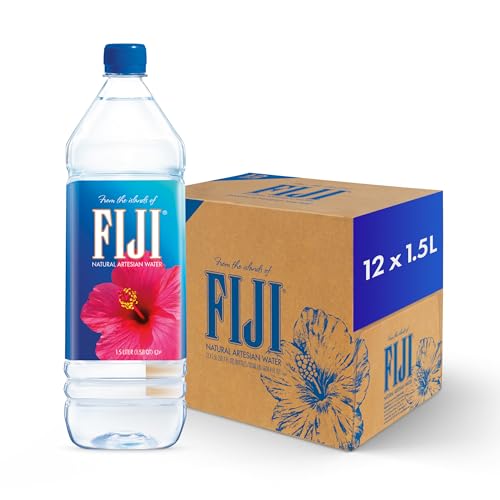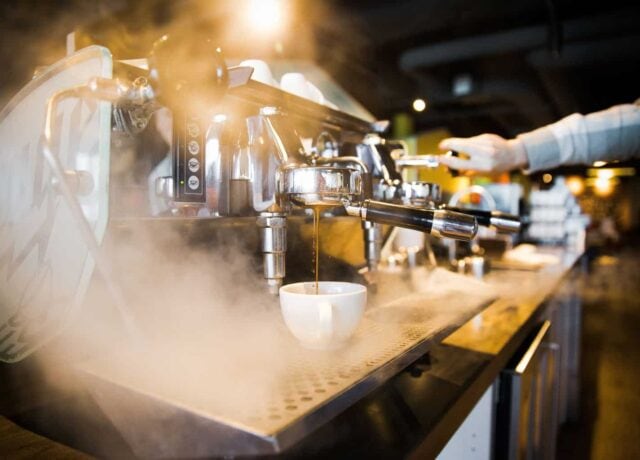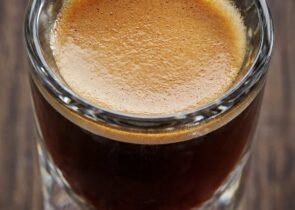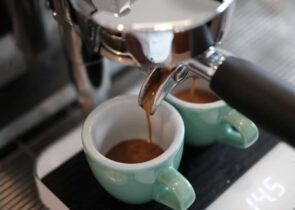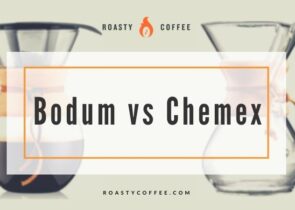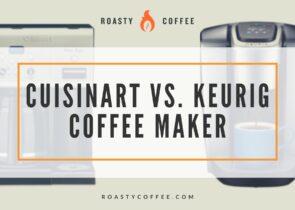Several factors go into pulling a perfect shot — quality coffee brewing equipment, a batch of top-notch espresso beans, and dedication to experimenting with coffee extraction times and temperatures. Water is another crucial player in brewing; if it’s subpar, your cup of coffee will be, too.
Technically, you could pair any water with your coffee equipment. But we’ve found bottled water is often the best way to go.
At a Glance: Best Bottled Water for Espresso Machines
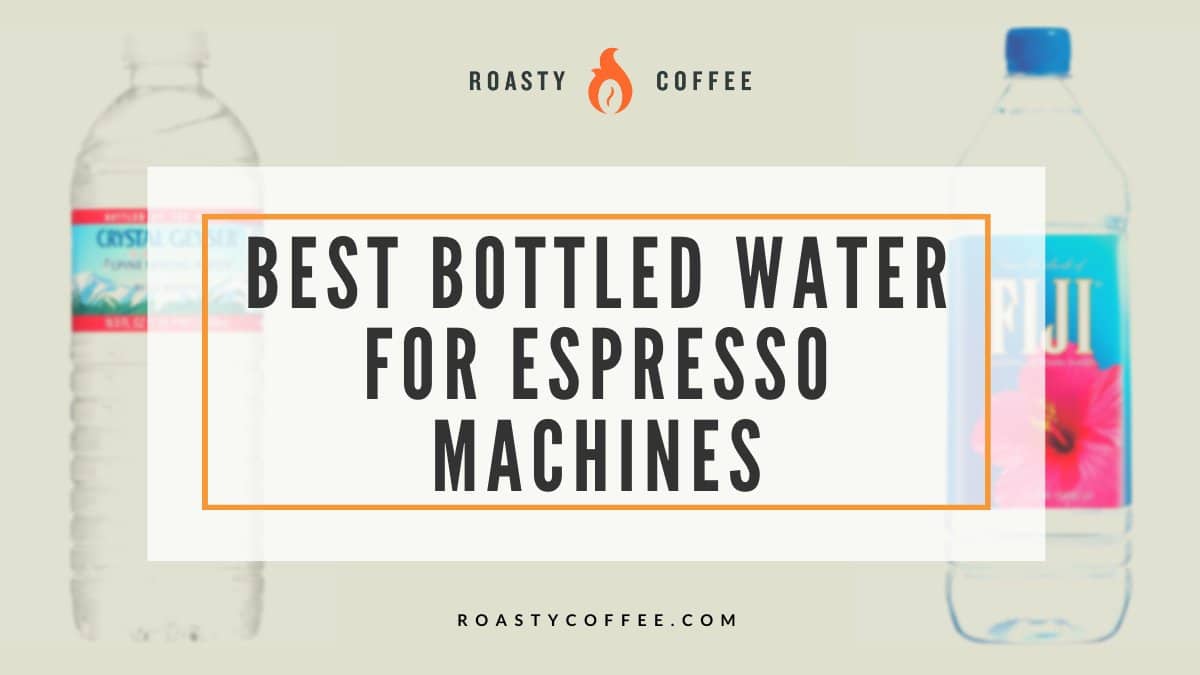
Quick Summary: Best Bottled Water for Espresso Machines
 | Our Top Choice Alpine Spring Water |
| Check on Amazon → |
 | Saratoga Natural Spring Water |
| Check on Amazon → |
 | Fiji Natural Artesian Water |
| Check on Amazon → |
 | Mountain Valley Spring Water |
| Check on Amazon → |
Bottled Water vs. Tap Water
You probably already know the stuff in water bottles differs from what flows out of your faucet. Both are fit for consumption, but tap and bottled water have different regulations.
The United States Environmental Protection Agency (EPA) regulates tap water, and public water systems distribute it to members of certain regions through pipe systems. Consumers don’t get to choose which public water system delivers their H2O; their geographic location or municipal area determines it.
The Food and Drug Administration, or FDA, regulates bottled water. Unlike tap water, which serves multiple purposes, bottled water’s sole intent is consumption. And instead of flowing from a pipe system, bottled water comes in sealed individual containers. Bottled water consumers get to choose what they drink based on taste and quality rather than having to settle for whatever flows from the pipe system.
Types of Bottled Water
Not all bottled water is the same — any serious water drinker will tell you that! And we don’t just mean in terms of taste. We’re talking manufacturing processes, too.
Some of the different bottled water options you’ll find on your local grocery store’s shelves include:
- Spring Water: Spring water comes from underground formations. The water flows from these to the earth’s surface.
- Purified Water: Purified water is any that has undergone distillation, deionization, reverse osmosis, or another similar filtration process. The resulting liquid meets the U.S. Pharmacopeia’s definition of purified water.
- Mineral Water: Natural water with no less than 250 parts per million total dissolved solids falls into the mineral water category.
- Sparkling Water: Sparkling water gets treated until it contains the same amount of carbon dioxide it had when it flowed from its source.
- Artesian Water: Artesian water comes from a well that taps a confined aquifer (aquifers are underground layers of rock or sand that bear water). The water level here is above the height of the aquifer.
- Well Water: Well water comes from a hole drilled or bored into the ground, tapping into an aquifer.
Our bottled water breakdown came from the International Bottled Water Association, which, according to its site, is “the authoritative source for information about all types of bottled water.”
Alkaline water is another bottled water type. Technically, it falls into the mineral water category. It contains minerals (alkaline ones, if you haven’t already guessed) specifically intended to give your body an extra hydration boost.
Further Distinguishing Types of Water
Filtered vs. Distilled Water
Contrary to popular belief, filtered and distilled water aren’t the same. Both types of water undergo purification, but the difference lies in what gets removed during purification.
All fresh water contains “impurities,” including minerals, nutrients, or contaminants. Distillation removes everything, even helpful minerals like calcium and magnesium, leaving nothing behind but pure water. Anything distilled is considered bad coffee water. Removing those “impurities” leaves water tasting a little bit flat. And, unfortunately, that flat-tasting water gives even the boldest beans a lackluster flavor profile.
While filtered water’s harmful contaminants get removed, some of its “impurities” remain. So, it doesn’t taste as flat as distilled water.
Hard vs. Soft Water
Hard and soft refer to the level of mineral content, specifically calcium and magnesium, in water. Hard water has those minerals; soft water does not.
So, which is better?
Well, neither hard nor soft water is harmful when consumed. But hard water can do a number on your hair, skin, home, and appliances — even your beloved home espresso machine.
Hard water’s chemicals can leave hard-to-clean residue on your showerheads, faucets, and dishes, not to mention dry out hair and skin by stripping them of their natural oils. Hard water can also cause lifespan-shortening mineral buildup in water-dependent appliances.
Based on those facts, you might think there’s no doubt about it: soft water beats hard. But when brewing coffee is involved, it’s not that simple.
The war between soft and hard water divides coffee lovers. Some declare soft the best coffee-brewing water because it’s unlikely to harm your brewer. Others prefer hard water for the bold flavors it gives your joe, as its mineral compounds stick to the coffee grounds’ flavor elements.
Preferences aside, hard and soft water have pros and cons for brewing. Sure, you can take other coffee enthusiasts’ opinions into account here. But the best way to choose is to consider the water’s total dissolved solids (TDS). TDS, measured in parts per million (ppm), determines water’s hardness. The Specialty Coffee Association recommends staying in the 50 to 175 ppm range.
Roasty Rankings: Our Picks for the Best Bottled Water for Espresso Machine
That concludes our water chemistry lesson. Now, for the moment you’ve waited for: our roundup of the best-bottled water options to pair with your espresso coffee machine!
Crystal Geiser Natural Alpine Spring Water
Crystal Geiser’s Natural Alpine Spring Water tops our list of bottled water recommendations. Crystal Geiser’s offerings are affordable compared to other bottled water brands. Plus, they’re available at most grocery stores. These factors make this H2O easily accessible to plenty of espresso enthusiasts.
Besides being accessible, these bottles of water yield flavorful results, thanks to spring water’s natural taste. There are enough minerals to enhance the espresso’s flavor but not enough to damage the machine.
Saratoga Natural Spring Water
The first thing we noticed about Saratoga Natural Spring Water was the packaging. With its pH of 6.9, this water comes in a striking cobalt blue glass bottle you can reuse — yay, sustainability! — and gives it a more upscale vibe.
Unfortunately, packaging like that means a higher price tag. So, if you’re searching for the lowest-priced bottled water to run through your coffee beans, this isn’t it. However, regardless of which size you buy (12 or 28 ounces), you can use one bottle of Saratoga Natural Spring Water for multiple espresso-brewing sessions.
Fiji Natural Artesian Water
Fiji is one of the world’s most popular bottled water companies. So, it being one of our espresso brewing process-approved water bottles shouldn’t be surprising. But we aren’t recommending Fiji here just because it’s popular; we’re recommending it because of how it tastes.
Fiji Natural Artesian Water’s flavor comes from the volcanic rock it filters through. As the water flows through it, it gathers the minerals and electrolytes that provide its soft, smooth taste. And since all of that goodness comes from the volcanic rock, the folks at Fiji don’t have to add anything extra to their product.
The downside to using Fiji Water in your espresso machine is that it leaves a smoky, slightly burnt taste in your cups of coffee; while some love this, others find it too strong.
Mountain Valley Spring Water
Last but certainly not least is Mountain Valley Spring Water. The Hot Springs, Arkansas-based company bottles its product in glass, making it an eco-friendlier alternative to water packaged in plastic.
Mother Earth approves of Mountain Valley’s glass bottles, and you’ll feel the same about what’s inside them. This water comes from a spring in the Ouachitas and filters through granite-based aquifers — its minerals and crisp taste come from those — before landing in your glass.
Mountain Valley Spring Water’s TDS is higher than the ideal for brewing, but we decided to include it on our list anyway. If you’re willing to risk using harder water in your brewer, this is the product we recommend.
Frequently Asked Questions
Should I Use Distilled or Purified Water for Coffee?
The consensus is that you shouldn’t run distilled water through your coffee machine. Just as seasonings enhance food, the minerals in water upgrade the taste of your joe. Distilled water, lacking minerals, can make coffee taste flat and disappointing.
What’s more is that, over time, distilled water can damage your brewer. The ultra-pure water takes the ions (a.k.a. positively or negatively charged minerals) from the machine, degrading its performance and causing it to break down slowly.
Unlike distilled, purified water is not devoid of minerals, but still, it’s not the best choice for brewing espresso or regular coffee either. It doesn’t have a high enough mineral content to produce flavorful coffee and run through your machine without causing problems.
For best results, use filtered water. It has undergone processes that get rid of unwanted contaminants. However, filtered water endures fewer purification processes than purified or distilled water. Since it’s safe without being 100 percent pure, it’s the best type of water for your brewing endeavors.
Can I Use Tap Water for Espresso?
There isn’t anything wrong with brewing coffee with tap water. However, you don’t have any control over what comes out of the faucet. Depending on where you live, your water may be soft or hard (we’ll distinguish between the two below). That matters because water hardness can influence the taste of your coffee.
This information makes answering the question “Why use bottled water for espresso machines?” relatively simple: to ensure consistent-flavored brews!
Do I Need to Descale if I Use Bottled Water?
Unfortunately, choosing bottled water over regular tap water for your espresso machine doesn’t excuse you from regularly descaling it.
Most bottled water is filtered, not distilled, so scale buildup is still possible. So, you shouldn’t ditch your descaling routine just because you have a few bottles of Crystal Geyser in your kitchen.
Besides, failing to descale an espresso machine can lead to many problems, some of which you can’t solve without buying a brand-new brewer. In our opinion, that’s not worth the risk.
Can I Use Boiled Water for an Espresso Machine?
You can use boiled water to brew espresso, but that doesn’t mean you should.
First of all, boiling unfiltered water doesn’t remove anything from it. Sure, the process kills pathogens, but they’re still there; you have to cross your fingers and hope you boiled the water long enough to kill off anything that could be harmful to your health. This makes drinking boiled unfiltered water risky. So, naturally, using it to make joe is, too.
Since boiling water doesn’t alter its mineral content, the process doesn’t reduce its hardness either. So, if you were hoping this was a means of getting softer water for your brewing endeavors, you’ll end up disappointed. You’re better off using filtered water or investing in a water softener.
An Eco-Friendly Alternative
Some at-home brewers may be reluctant to use bottled water because of all the plastic waste. And yes, some options come in glass bottles, but those are often more expensive. For those, the best option is a home filtration system, like a filter pitcher or sink filter.
Filters remove unwanted impurities from your water while leaving the good minerals behind, creating H2O that tastes more like it came from a bottle than the tap. However, these don’t soften water, so if you’re in a hard water area, you’ll probably need to invest in a water-softening system, too.
Water softening systems use ion swapping to remove hardening mineral ions — calcium, for instance — and switch them out for sodium ions.
Choose Bottled Water for Brewing
For maximum control over what goes into your coffee maker — and to guarantee you don’t lose any of your beans’ flavor during brewing — choose bottled over water from the tap. Tap water’s mineral content and hardness varies depending on external factors; as those factors change, so will the taste of your espresso.
On the other hand, bottled water is consistent. So, if you use the same type of bottled water each time you brew, your espresso flavors and aromas won’t change.
Just be sure to look into the product’s mineral content and hardness before you buy anything. And, for the planet’s sake, try to purchase something packaged in glass or recyclable plastic bottles.
Happy Caffeinating!



